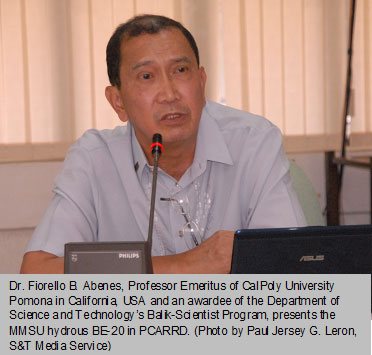 Current standards in the Philippines do not allow water in any gasoline blends.
Current standards in the Philippines do not allow water in any gasoline blends.
However, MMSU hydrous, BE-20, a unique blend of E-10 gasoline and azeotropic ethanol that contains 5% water may augur well for the implementation of the Biofuels Act of 2006 (Republic Act 9367). This says Mariano Marcos State University (MMSU) Prexy Mirriam E. Pascua.
To backstop the prexy’s declaration, a seminar on MMSU hydrous BE-20, an invention of MMSU in Ilocos Norte was recently conducted at the PCARRD Headquarters in Los Baños, Laguna.
Dr. Fiorello B. Abenes, Professor Emeritus of CalPoly University Pomona in California, USA and an awardee of the Department of Science and Technology’s Balik-Scientist Program conducted the seminar.
The hydrous ethanol is produced from the fermentation of sugar cane juice, sweet sorghum syrup and jiggery, as well as ethanol produced from baggasse.
Dr. Abenes, along with MMSU’s Dr. Shirley Agrupis and Dr. Roque Ulep, led the project that is anchored on Republic Act 9367 or the Biofuels Act of 2006.
Originally, the team thought of producing anhydrous ethanol but found it difficult and expensive to remove the last 5% water from ethanol. This is when Dr. Abenes thought of formulating a gasoline-ethanol blend using hydrous ethanol. However, phase separation in the hydrous ethanol-gasoline blend posed a challenge. Fortunately, the problem did not occur when they refrigerated the formulation.
In an MMSU press release, it was reported that that hydrous ethanol formulation was tested on 4-stroke water pumps, motorcycles, and FX vehicles “with no apparent problems”. The formulation was also tested on a 10-year-old FX car driven to Baguio to test the ability of the vehicle to navigate steep mountainous terrain. “The vehicle never sputtered or stalled. The engine spurred like it was new,” said Abenes. The only notable observation was a decrease in mileage efficiency, which is expected whenever higher ethanol blends are used.
“The vehicle is a gas guzzler and was not optimized to run on highly oxygenated fuels. The fuel efficiency should be better in newer vehicles that have automated oxygen sensors,” Abenes explains.
In the same release, MMSU Prexy Mirriam E. Pascua was quoted saying “this is a significant invention, if engines can run just as well on hydrous ethanol compared to the anhydrous, it can save the country some P6 billion a year.”
Incidentally, the fuel is still undergoing rigorous testing at the MMSU College of Engineering.
